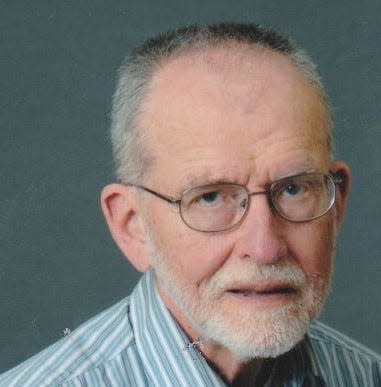Paul deLespinasse: The politics of translation: Putin's 'geopolitical disaster' remark
- Oops!Something went wrong.Please try again later.
In 2005 Vladimir Putin, according to the official English version on the Kremlin website, stated that "above all, we should acknowledge that the collapse of the Soviet Union was a major geopolitical disaster of the [20th] century."
But his remark usually shows up in American publications much more sensationally: "Above all, we should acknowledge that the collapse of the Soviet Union was the greatest geopolitical disaster of the [20th] century."
This is often quoted to indicate Putin's mindset in discussions of Russia's outrageous war against Ukraine.

Of course Putin's remarks were in Russian, so both versions of what he said are translations.
There are enough troubling things about Putin's recent behavior that there is no need to exaggerate, let alone to seriously mistranslate, things he has said.
Translation is not always easy. Literal "one to one" translations are often impossible or produce meaningless gibberish, so translators must make choices. As with all choices the usual elements of decision and action — goals, side effects, circumstances — all come into play.
The translator may seek to convey the meaning expressed by the words being translated as closely as possible.
On the other hand, the translator may be mainly interested in manipulating people's behavior. The authenticity of the translation then becomes of secondary importance.
When we check Putin's statement in Russian we find that he did not say that the Soviet collapse was "the greatest" geopolitical disaster of the century.
The Russian language does not have words for "a" and "the." Whether a speaker has said "a book" or "the book" must therefore be determined by context.
The key word in Putin's statement is in the grammatical form that Russian experts call a “simple superlative.” As an authoritative textbook notes, “The simple superlative does not show comparison, but rather indicates a high degree of the given quality.”
That is why the correct translation is “a major catastrophe” rather than “the greatest” catastrophe." "The greatest" is a comparison, whereas "a major" only indicates a high degree.
The Kremlin's official English translation is thus in full agreement with the grammatical principles.
The Soviet breakup was genuinely a major catastrophe. It disrupted production by putting important parts of the supply chain into 15 independent countries, with many obstacles to free trade. It caused inflation destroying people's life savings. It turned Russian speakers in the non-Russian countries into resented minorities, often discriminated against.
But it's hard to imagine that any Russian could argue with a straight face that the Soviet Union's disintegration was the greatest geopolitical catastrophe of the 20th century.
After all, the Soviet Union suffered around twenty million fatalities and horrible physical devastation during World War II. And many other countries and populations also suffered horribly. Now there was a catastrophe! The breakup of the USSR caused a lot of problems, but nothing on the scale of World War II.
The translator who came up with the incorrect version may have just been incompetent. Or the incorrect translation may have reflected his or her political desires.
If it was a political action, the incorrect translation probably sought to exaggerate Putin's attitude towards the dismemberment of the USSR and his desire to put it back together again.
When I googled Putin's statement a few years ago, the incorrect translation appeared ten times more often than the correct one. Of course many writers may simply be quoting the version they have seen, unaware that it is incorrect.
To a great extent the incorrect translation is more dramatic, and therefore more "newsworthy." Perhaps, since it reflects well-founded skepticism about Russian foreign policy, it is more widely quoted thanks to confirmation bias.
Of course Putin's deeds speak much louder than his words. But there are many possible interpretations of what his goals are. We should not allow an incorrect translation of his words to dominate our interpretation of his actions.
— Paul F. deLespinasse is professor emeritus of political science and computer science at Adrian College. He can be reached at pdeles@proaxis.com.
This article originally appeared on Hillsdale Daily News: Paul deLespinasse: The politics of translation: Putin's 'geopolitical disaster' remark
